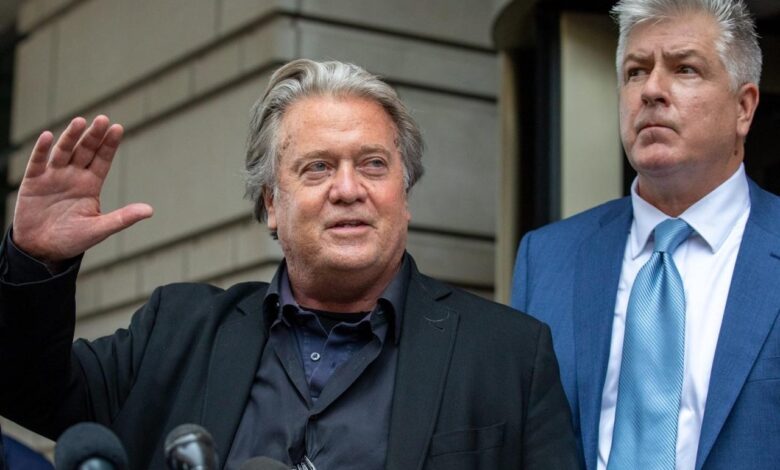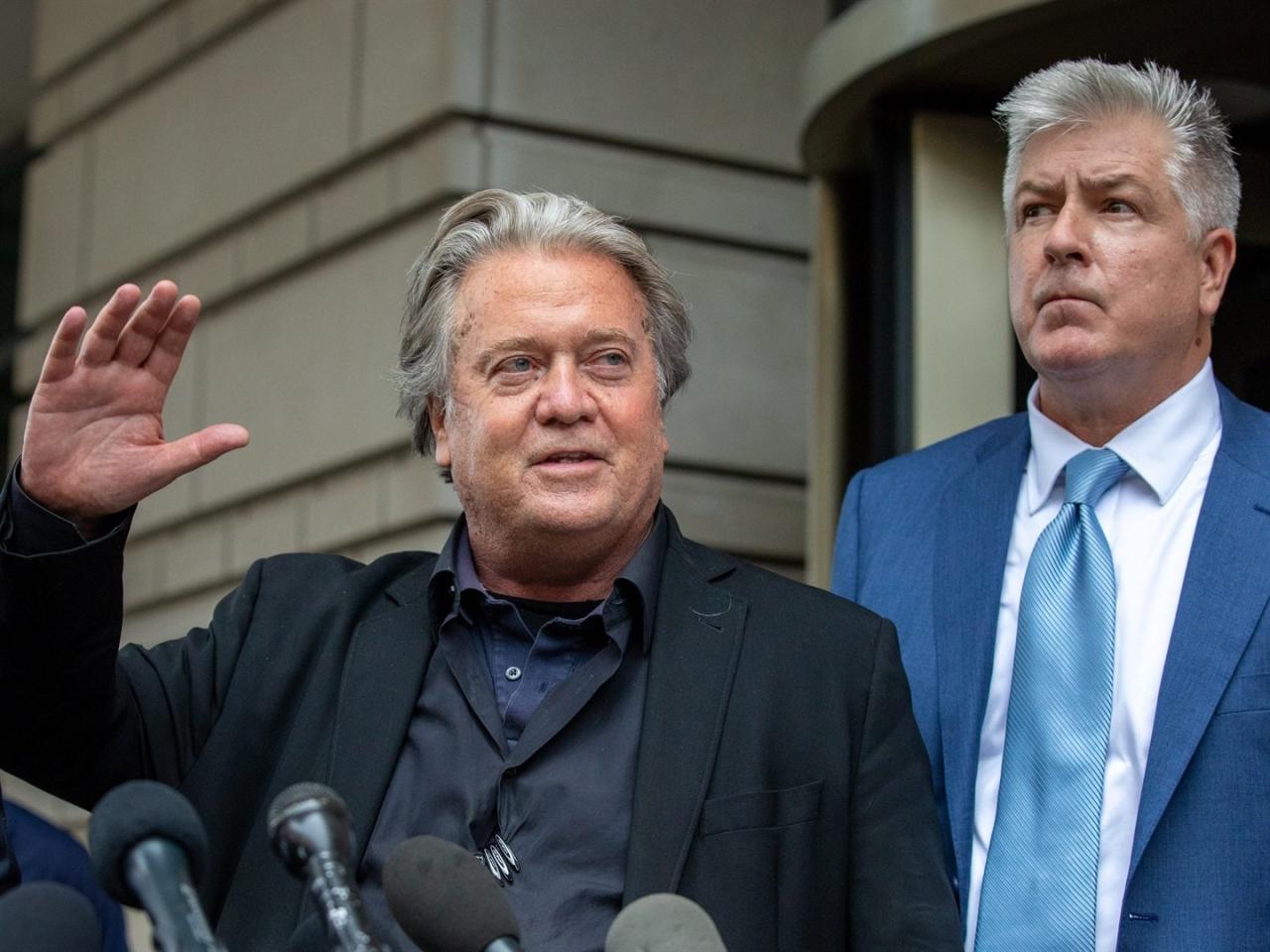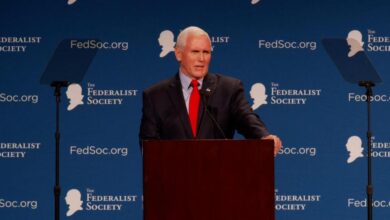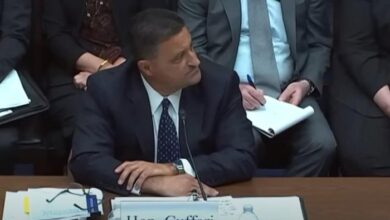
Steve Bannons Contempt of Congress Conviction: A Quick Look
Steve bannons contempt of congress conviction briefly explained – Steve Bannon’s contempt of Congress conviction briefly explained: Former White House strategist Steve Bannon was found guilty of defying a subpoena from the House Select Committee investigating the January 6th Capitol attack. Bannon, a close ally of former President Donald Trump, refused to comply with the committee’s request for documents and testimony, arguing that Trump had invoked executive privilege.
However, the court ultimately rejected this claim, leading to Bannon’s conviction and a four-month prison sentence.
This case has significant legal and political implications, raising questions about the limits of executive privilege and the potential for individuals to defy congressional inquiries. It also highlights the ongoing scrutiny surrounding the events of January 6th and the role played by Trump and his associates.
Steve Bannon’s Background
Steve Bannon is a controversial figure who has played a significant role in American politics. His influence extends beyond his time in the Trump administration, encompassing his political affiliations, beliefs, and involvement in the January 6th Capitol attack. Understanding his background provides insight into the dynamics of contemporary American politics.
Role in the Trump Administration
Steve Bannon served as the White House Chief Strategist during the first seven months of Donald Trump’s presidency. In this position, he was a key advisor and architect of the administration’s policies and messaging. He was known for his nationalist and populist views, advocating for policies that prioritized American interests and challenged the established political order.
His influence was particularly felt in the areas of immigration, trade, and foreign policy. He played a significant role in shaping the administration’s “America First” agenda, which prioritized domestic concerns over global engagement.
Political Affiliations and Beliefs
Steve Bannon is a prominent figure in the alt-right movement, a far-right ideology that embraces white nationalism, anti-immigration sentiment, and a rejection of mainstream conservatism. He has been associated with various far-right organizations and publications, including Breitbart News, which he led before joining the Trump administration.
Bannon’s political beliefs are characterized by a strong emphasis on nationalism, populism, and a rejection of globalism. He has been a vocal critic of the establishment, both in the Republican Party and the Democratic Party, and has advocated for a more nationalist and protectionist approach to American politics.
Involvement in the January 6th Capitol Attack
Steve Bannon played a central role in the events leading up to the January 6th Capitol attack. He was a vocal supporter of Donald Trump’s claims of a stolen election and encouraged his supporters to “fight like hell” to overturn the results.
In the weeks leading up to the attack, Bannon hosted a podcast where he discussed strategies for challenging the election outcome. He was later indicted by the House Select Committee investigating the January 6th attack for contempt of Congress after refusing to comply with a subpoena.
Steve Bannon’s contempt of Congress conviction was a direct result of his refusal to comply with a subpoena demanding documents and testimony related to the January 6th Capitol riot. It’s a reminder that even powerful figures must answer to the law.
It also raises the question of how to stay right when you’ve been wronged, a challenge addressed in this insightful article, how to stay right when youve been wronged. While Bannon’s conviction may be seen as a victory for justice, it also highlights the importance of upholding the rule of law, even when faced with difficult choices.
The committee argued that Bannon had direct knowledge of Trump’s actions and communications in the lead-up to the attack and that his refusal to cooperate hindered the investigation.
The Contempt of Congress Charges

Steve Bannon, a prominent figure in the Trump administration, was found guilty of contempt of Congress in July 2022. This conviction stemmed from his refusal to comply with a subpoena issued by the House Select Committee investigating the January 6th attack on the U.S.
Capitol. The charges highlight the crucial role of Congress in holding individuals accountable for their actions, even when those individuals hold positions of power.
The Subpoena and Bannon’s Refusal
The House Select Committee investigating the January 6th attack sought information from Bannon regarding his communications and knowledge of the events leading up to the attack. The committee believed Bannon, who served as Trump’s campaign manager and White House strategist, possessed valuable insights into the planning and execution of the events that unfolded on January 6th.
The committee issued a subpoena to Bannon on September 23, 2021, demanding his testimony and documents by October 7, 2021.
Bannon, however, defied the subpoena, claiming that he was shielded from testifying by executive privilege. He argued that his communications with Trump were confidential and protected from disclosure. This claim was ultimately rejected by the courts.
The Nature of the Information Bannon Refused to Provide
The House Select Committee sought information from Bannon regarding a number of key areas, including:
- His communications with President Trump and other individuals involved in the planning of the January 6th rally.
- His knowledge of any efforts to overturn the results of the 2020 presidential election.
- His understanding of the events that occurred on January 6th, including the attack on the Capitol.
Bannon’s refusal to provide this information was seen as a direct challenge to the authority of Congress and its ability to conduct oversight. The committee argued that Bannon’s actions were an attempt to obstruct its investigation and prevent it from getting to the truth about the January 6th attack.
The Trial and Conviction
Bannon’s trial for contempt of Congress began on July 18, 2022, in the U.S. District Court for the District of Columbia. The trial focused on Bannon’s refusal to comply with a subpoena issued by the House Select Committee investigating the January 6th attack on the U.S.
Capitol.
Key Arguments Presented During the Trial
The prosecution argued that Bannon’s refusal to comply with the subpoena was a deliberate act of defiance of Congress and an obstruction of its legitimate legislative function. The prosecution presented evidence that Bannon had been informed of the subpoena and its legal requirements, but he had chosen to ignore them.
They argued that Bannon’s actions were not a misunderstanding or a technicality but a deliberate attempt to undermine the Committee’s investigation.
Evidence Presented by the Prosecution and Defense
The prosecution presented evidence showing that Bannon had received the subpoena, understood its requirements, and had consulted with lawyers about his obligations. They also presented evidence that Bannon had publicly stated his intention to defy the subpoena, claiming that he was acting on the advice of former President Trump.
The defense argued that Bannon was not in a position to comply with the subpoena because he was in communication with former President Trump about the January 6th attack and was therefore subject to executive privilege. They also argued that the subpoena was overly broad and that Bannon had been denied due process.
The Jury’s Verdict and the Judge’s Sentencing
On July 22, 2022, the jury found Bannon guilty on both counts of contempt of Congress. The judge, Carl Nichols, sentenced Bannon to four months in prison and a fine of $6,500. Bannon appealed the conviction, but the U.S. Court of Appeals for the District of Columbia Circuit upheld the verdict.
Steve Bannon’s contempt of Congress conviction highlights the importance of accountability, even for those who hold powerful positions. It’s a stark contrast to the ongoing struggle for answers surrounding the brutal attack on a Columbia graduate student in Manhattan, as detailed in this article columbia graduate student brutally beaten in manhattan mother struggles for answers.
Bannon’s case serves as a reminder that no one is above the law, while the student’s case emphasizes the need for justice and support for victims of violence.
Legal and Political Implications
Steve Bannon’s conviction for contempt of Congress has significant legal and political implications. This case sets a precedent for future investigations and has the potential to reshape the relationship between the executive branch and Congress.
Impact on Future Investigations, Steve bannons contempt of congress conviction briefly explained
The conviction of Steve Bannon for contempt of Congress serves as a significant precedent for future investigations. This case demonstrates the willingness of the Department of Justice to prosecute individuals who defy congressional subpoenas. It sends a clear message that Congress has the power to compel testimony and that individuals who obstruct investigations will face consequences.
This precedent could encourage more aggressive investigations by Congress, as they now have a stronger legal basis to enforce their subpoenas.
Steve Bannon’s contempt of Congress conviction is a stark reminder of the power dynamics at play in our political system. While the former White House strategist faces legal repercussions for defying a congressional subpoena, it’s worth considering the mental fortitude required by those who navigate such turbulent waters.
Entrepreneurs, for instance, often face similar challenges, needing to be resilient and adaptable in the face of adversity. 11 mindset traits of successful entrepreneurs highlight these qualities, offering valuable insights into the mental makeup of those who thrive in unpredictable environments.
Bannon’s conviction serves as a cautionary tale, illustrating the consequences of defying authority, but also prompting reflection on the psychological resilience necessary to succeed in a world where power struggles are a constant reality.
Political Ramifications
Bannon’s conviction has significant political ramifications. The case highlights the deep partisan divide in the United States, as Republicans largely defended Bannon while Democrats supported the conviction. This case further solidifies the perception of a “two-tiered” justice system, with some individuals seemingly above the law.
The political fallout from this case could have implications for future investigations and the overall functioning of the government.
Public Opinion and Response: Steve Bannons Contempt Of Congress Conviction Briefly Explained
Steve Bannon’s conviction for contempt of Congress sparked a wide range of reactions, highlighting the deep political divisions in the United States. Public opinion was largely polarized, with strong opinions expressed by both supporters and critics of Bannon.
Public Reactions to Bannon’s Conviction
The conviction of Steve Bannon for contempt of Congress was met with mixed reactions from the public. Some viewed it as a victory for the rule of law and a necessary step to hold those in power accountable. Others saw it as a politically motivated prosecution and an attack on free speech.
Opinions from Supporters and Critics of Bannon
Supporters of Bannon, many of whom are ardent supporters of former President Donald Trump, saw the conviction as an attempt to silence dissenting voices and suppress conservative viewpoints. They argued that Bannon’s refusal to comply with the congressional subpoena was justified, as he believed the investigation was politically motivated.
They pointed to the fact that Bannon was not the first person to defy a congressional subpoena, and argued that he should not be treated differently.Critics of Bannon, on the other hand, saw his conviction as a necessary consequence of his defiance of the law.
They argued that Bannon’s actions were a direct attack on the legislative branch and a threat to the democratic process. They pointed to the fact that Bannon was not simply refusing to answer questions, but actively obstructing the investigation by refusing to appear altogether.
They also noted that Bannon had been warned about the consequences of his actions, but chose to defy the subpoena anyway.
Impact of the Case on Public Trust in Institutions
The Bannon case has contributed to a broader decline in public trust in institutions, particularly in the government. Many Americans believe that the government is too often used as a tool to punish political opponents, rather than to serve the public good.
This perception has been exacerbated by the increasing polarization of American politics, with each side accusing the other of abusing power and acting in bad faith.The Bannon case has also raised questions about the balance of power between the executive and legislative branches.
The conviction of a former White House advisor for contempt of Congress could be seen as a significant victory for the legislative branch, but it also highlights the potential for political conflicts to arise when one branch attempts to assert its authority over another.
Outcome Summary
The conviction of Steve Bannon for contempt of Congress serves as a stark reminder of the importance of accountability in a democracy. While Bannon’s case raises complex legal and political questions, it underscores the power of Congress to conduct oversight and investigate potential wrongdoing.
The outcome of this case will likely have a lasting impact on future investigations and the relationship between the executive and legislative branches.






